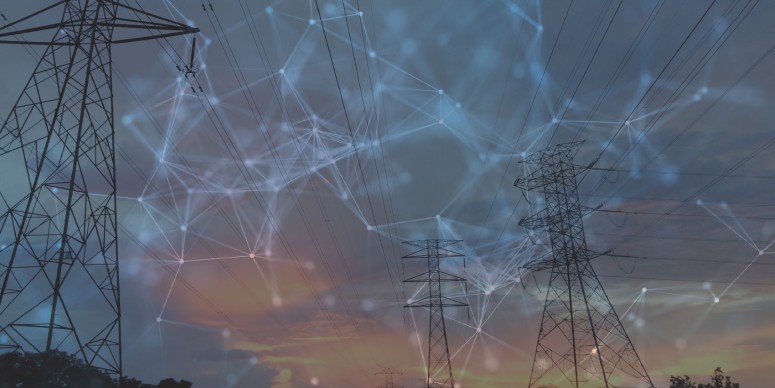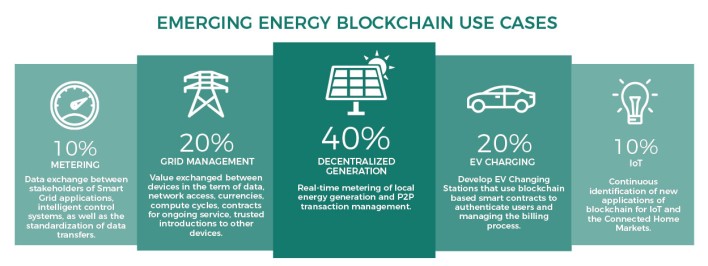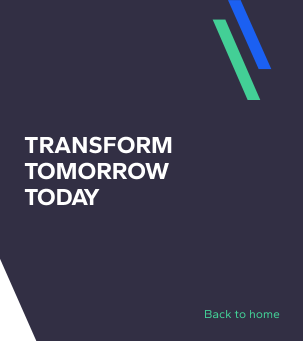Blog / Leadership & Transformation
Blockchain in the Energy Industry
Categories

In today’s post, we’re going to give you some specifics about blockchain in the energy industry, which has been somewhat slower than other sectors in embracing changes brought along by digital transformation. It would seem, however, that the introduction of blockchain and distributed ledger technology will speed things up and transform the well-established processes and markets.
This means that despite the significant investments in time, money, and effort required to adopt blockchain in the energy sector, the expected outcome makes it worth all the extra miles. In fact, blockchain seems to fit the energy segment perfectly, since it can enable the creation of automated, auditable and transparent records of generated power and its subsequent consumption.
If in 2018, the global market for blockchain technology was at 1.2 billion USD, by 2023, it’s expected to climb to more than 23 billion USD. The biggest contributor to this growth will be the financial sector but the energy sector will follow closely.
In what follows, we’re going to take a look at the main uses of blockchain in the sector, what’s the situation now and what we might expect from the future. In a more general view, we will speak about metering, grid management, decentralized generation, EV charging and IoT as the use cases of blockchain in energy with the biggest potential.

Blockchain for P2P Energy Trading and Decentralized Generation
Producing one’s own electricity and trading it with your neighbors within the community microgrids is probably the best-known blockchain-based solution in the sector. And no wonder, since the majority (40%) of blockchain in energy projects are focusing on building a peer to peer grid network and generating energy in a decentralized manner.
Using blockchain will permit us to measure in real-time the local energy generation and manage the P2P transactions. The potential in this category is large but since it depends heavily on regulation, the market still needs some time to evolve.
Grid Management
Blockchain could provide the solution for many issues that decentralized energy grids’ coordination means. For example, the installation of blockchain software with integrated smart contracts, coupled with smart-meter technology, allows for traceability and verification of energy sources, efficient peer-to-peer trading, better balancing and optimization of energy load and demand.
This step towards peer-to-peer trading also means bolstering the use of renewable energy and minimizing the need for energy companies, traders and payment providers. Add to that the reduced energy-transportation loss and it’s a considerable step toward a more efficient and ecological management model. With the transactions securely and automatically recorded and smart contracts in place, the users are better protected against cyber-attacks and the breach of their personal information.
Electric Vehicle Charging
The area of electric vehicle charging and sharing charging stations is perhaps one of the greatest near-term opportunities for the technology in the sector. An open blockchain platform will eliminate the lack of trust among charging service providers, property owners and owners of EVs. In that case, all parties will have access to the data and have a guarantee that it has not been tampered with.
Furthermore, research carried out by the University of Waterloo in Canada found that blockchain has the potential to drive electric-vehicle infrastructure and identified three steps that a company must take to incorporate blockchain technology into an energy system. The steps were as follows: firstly, to identify the involved parties and their trust relations, secondly, to design a minimal blockchain system includes smart contracts. The last step builds on the already in place blockchain system, that permits to migrate the rest of the system constantly over time.
Metering
If we use blockchain for smart contracts and smart metering, we can carry out automated billing for consumers and distributed generators. Integrated metering infrastructure and automated billing comes with the potential of administrative cost reduction.
IoT
IoT integrated with blockchain has many uses in the field of energy. For example, the digital twins of windmills would enable predictive maintenance. Also, sensor data from wind parks and power plants would enable continuous surveillance. Blockchains would facilitate significantly IoT platforms and asset management.
Blockchain IoT solutions can also be used for smart metering, real-time monitoring and asset tracking. On the other hand, blockchain will also make the system more trustworthy. The infrastructure of distributed nodes in the network would help to mitigate the risk of having a central server authority that acts as a single point of failure.
In this article, we won’t go into detail about the development of cryptocurrencies for monetary payments within the energy industry, that is another important use area. However, as we have seen above, there are many reasons why blockchain and DLT technologies have caught the attention of energy supply firms, technology developers, financial institutions, national governments and startups. Replacing outdated and less secure trading and documentation platforms has become possible thanks to the blockchain technologies.
Start your learning journey today and shape the blockchain-powered tomorrow!





